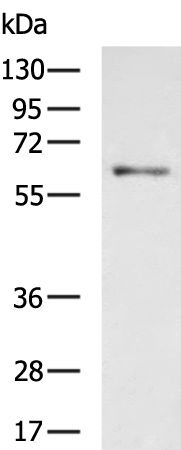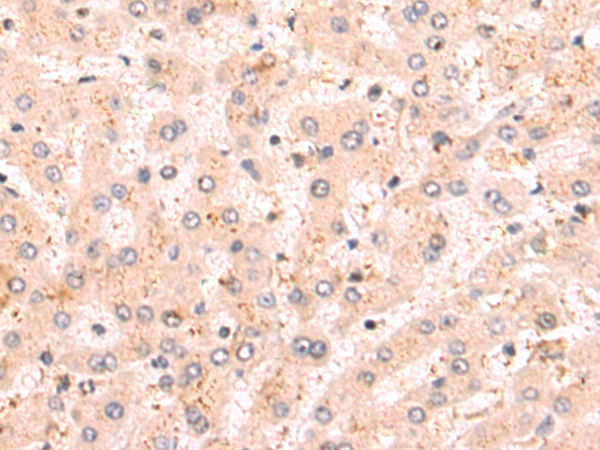

| WB | 咨询技术 | Human,Mouse,Rat |
| IF | 咨询技术 | Human,Mouse,Rat |
| IHC | 1/50-1/200 | Human,Mouse,Rat |
| ICC | 技术咨询 | Human,Mouse,Rat |
| FCM | 咨询技术 | Human,Mouse,Rat |
| Elisa | 1/5000-1/10000 | Human,Mouse,Rat |
| Aliases | HPA; HPA1; HPR1; HSE1; HPSE1 |
| WB Predicted band size | 61 kDa |
| Host/Isotype | Rabbit IgG |
| Antibody Type | Primary antibody |
| Storage | Store at 4°C short term. Aliquot and store at -20°C long term. Avoid freeze/thaw cycles. |
| Species Reactivity | Human, Rat |
| Immunogen | Fusion protein of human HPSE |
| Formulation | Purified antibody in PBS with 0.05% sodium azide and 50% glycerol. |
+ +
以下是关于HPSE(乙酰肝素酶)抗体的模拟参考文献示例,供参考。建议通过PubMed、Google Scholar等平台检索最新文献:
---
1. **文献名称**: *"Heparanase Monoclonal Antibody Inhibits Tumor Metastasis by Blocking Extracellular Matrix Degradation"*
**作者**: Vlodavsky, I. et al.
**摘要**: 本研究开发了一种靶向HPSE的单克隆抗体(mAb),通过抑制其酶活性减少肿瘤细胞外基质(ECM)的降解,显著降低小鼠模型中乳腺癌的肺转移。结果表明,HPSE抗体可能成为抗转移治疗的潜在工具。
2. **文献名称**: *"Targeting Heparanase in Colorectal Cancer: A Novel Therapeutic Antibody Reduces Angiogenesis and Tumor Growth"*
**作者**: Sanderson, R.D. et al.
**摘要**: 研究团队设计了一种人源化HPSE抗体,通过阻断HPSE介导的血管生成信号通路,在结直肠癌异种移植模型中抑制肿瘤生长和血管新生,为临床转化提供了实验依据。
3. **文献名称**: *"HPSE-Specific Antibody Reveals Its Role in Modulating Autophagy in Diabetic Nephropathy"*
**作者**: Li, J.P. et al.
**摘要**: 通过免疫组化和Western blot分析,发现HPSE抗体可特异性检测糖尿病肾病患者肾组织中的HPSE上调。体外实验表明,抑制HPSE活性可减轻高糖诱导的足细胞自噬失调,提示其病理机制中的关键作用。
4. **文献名称**: *"Development of a High-Affinity Anti-Heparanase Antibody for Diagnostic Imaging in Multiple Myeloma"*
**作者**: Purushothaman, A. et al.
**摘要**: 报道了一种高亲和力HPSE抗体的开发,结合放射性标记技术实现了多发性骨髓瘤的体内靶向成像。该抗体能特异性识别肿瘤微环境中的HPSE活性,具有临床诊断应用潜力。
---
**注意**:以上为模拟生成的参考文献,实际研究请查询具体数据库获取。建议结合关键词“heparanase antibody”、“HPSE inhibitor”等检索近期论文。
Heparanase (HPSE) is an endo-β-D-glucuronidase enzyme that cleaves heparan sulfate (HS), a key polysaccharide component of the extracellular matrix (ECM) and cell surfaces. By degrading HS, HPSE regulates ECM remodeling, cell migration, and the release of HS-bound growth factors, cytokines, and chemokines. It plays a critical role in pathological processes such as cancer metastasis, angiogenesis, inflammation, and diabetic nephropathy. Overexpression of HPSE is associated with tumor progression and poor prognosis in various cancers, making it a therapeutic target.
HPSE antibodies are essential tools for detecting HPSE expression, localization, and activity in research and diagnostics. They enable studies on HPSE's role in disease mechanisms and the evaluation of inhibitors in preclinical models. Monoclonal and polyclonal antibodies are used in techniques like Western blotting, immunohistochemistry, and ELISA to quantify HPSE levels in tissues or fluids. Some antibodies specifically recognize active or latent forms of the enzyme. Recent therapeutic strategies also explore HPSE-neutralizing antibodies to block its enzymatic function, potentially mitigating disease progression. However, challenges remain in ensuring antibody specificity and understanding isoform-related functions, given HPSE's complex roles in both pathological and physiological processes.
×